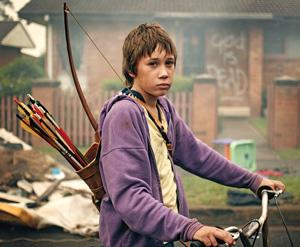Founded by John Hanshaw ’89. Washington, D.C.: January 2009 and annually.
 In I Love Sarah Jane, a short film set during a zombie apocalypse, Jimbo is 13 and can think of only one girl. |
It all started with “the killa gorilla.” In 2003, John Hanshaw entered the 48 Hour Film Project in Washington, D.C.—a contest that challenges filmmakers to make a short movie in a weekend. The product of this frenzied filmmaking was The Big Squeeze, a “very serious” movie, jokes Hanshaw, in which he plays a private investigator tracking a serial killer dressed as a gorilla. Wanting to show the film to a wider audience, he rented a local theater, and tickets promptly sold out. “I thought, this is interesting,” says Hanshaw, who had been working at PBS and the Japan Broadcasting Corp. “Maybe I should turn this into a regular event.”
The result was the Guerrilla Film Fest, billed as providing “an alternative venue for independent and foreign filmmakers who work outside the Hollywood system.” Taking as a mascot a stylized gorilla with a Che Guevara beret and visage, Hanshaw headlined his new Web site (www.gfilmfest.com) with a modified quote from the same revolutionary: In 1965, Guevara said, “As long as imperialism exists, it will, by definition, exert its domination over other countries. Today that domination is called neocolonialism.” Hanshaw replaced “neocolonialism” with “Hollywood.”
In January 2009, the eighth Guerilla Film Festival opened at the Goethe-Institut Washington, featuring such films as I Love Sarah Jane, a 14-minute coming-of-age story, directed by Spencer Susser, about a zombie apocalypse and a schoolboy crush. Hanshaw seeks films that are “working against the system, thematically or financially,” he says. “I look for subjects that don’t fall into the category of light entertainment or blockbuster fare. The films deal with real social issues that are gritty and not very pretty.” Many of the movies are made on a tight budget, and most are short films (of up to 40 minutes), which tend to have less commercial application.
Initially, the focus was on Washington, D.C., filmmakers, but when Hanshaw ran short of local material, the festival made a national call for entries. “It kind of exploded,” says Hanshaw, who had to wade through hundreds of hours of screenings. Now, he chooses most of the films by attending other festivals, like Sundance, and closing the deal with directors on the spot.
Although the festival gives its attention to independent artists and up-and-coming directors, its interests occasionally overlap with the mainstream film world. In 2005, Hanshaw screened Wasp, a short by Andrea Arnold about a single mother in the north of England who abandons her four children in a parking lot to have a drink with an old boyfriend. “You’re on the edge of your seat the whole time,” Hanshaw says. “It has all the tension of a feature film bundled into 15 minutes.” Wasp went on to win an Oscar for best short film. Another Guerilla film, Gary McKendry’s Everything in This Country Must, the story of a soldier and a village girl in Northern Ireland, was also nominated for an Oscar.
When the Guerrilla Film Festival became too labor-intensive, Hanshaw switched from a biannual to an annual
format. But when fans kept asking for more, he created the Washington Film Institute to allow for additional screenings and “not scare people off with the name,” Hanshaw says. He established collaborations with foreign embassies that tip him off to lesser-known international filmmakers. The WFI now screens feature-length films and double features. The Guerrilla Filmmaking Boot Camp is another offshoot. It offers one-day intensive workshops on the basics of camera work, lighting and directing. “There are a lot of frustrated lawyers in this town who want to know the basics, but not spend $20,000 on film school,” Hanshaw says.
A political science major at Amherst, Hanshaw was influenced most by his English classes, particularly a course on writing for film with Professor of English John Cameron. Senior year, a friend who managed WAMH corralled Hanshaw into writing scripts for a phony news radio show. “It was like The Daily Show,” the filmmaker recalls, “but about one-tenth as funny.” As for his current artistic projects, Hanshaw is at work on a screenplay about Internet dating: “It’s a comedy and a tragedy all wrapped into one.”
Katherine Jamieson is a freelance writer who lives in Whately, Mass. Her work has been published recently in Ode, Yoga+ and Clean Eating magazines.
Photo courtesy of Aquarius Films.